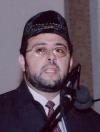Issue Date: May 14, 2004
By JOHN L. ALLEN JR. Georgetown University’s Muslim chaplain has said that if the university were to ever remove crucifixes from its classrooms, as some students and even faculty have proposed, he would resign. “I will not continue to be at Georgetown if that cross is removed,” said Imam Yahya Hendi in Rome May 5. “I believe religion has a lot to contribute to Georgetown and to America. An attempt to remove religious values from our public discourse is dangerous.” A widely quoted spokesperson for Muslims in the United States, Hendi also said that he believes global Islam needs an authoritative institution that can speak for Muslims as an antidote to the disproportionate influence of radical voices. He also called on the Saudi government to offer greater freedom for religious minorities, long a sore point among Western critics of Islam. Georgetown is the only university in America with a full-time Muslim chaplain, a position Hendi has held for five years. He was in Italy at the invitation of the United States embassy to speak about the experience of religious pluralism in America. Georgetown University has periodically debated whether or not crucifixes should be removed from classrooms. Roughly half of the student population today is non-Catholic, and some students and faculty have argued that respect for pluralism requires a religiously neutral academic environment. Others concerned with a loss of the university’s Catholic identity have opposed such a move. Hendi said that beyond philosophical questions, there’s a practical reason he wants the crucifixes to stay: If Georgetown loses interest in religion, it will eventually lose interest in Islam. “If this religious identity were to go, someone will come on board and say, ‘I don’t care about this whole thing. You guys all leave,’ ” Hendi said. In what he termed a great irony, Hendi noted that most religious minorities at Georgetown, especially Muslims and Jews, have firmly opposed removing the crucifixes. The pressure, he said, came largely from Catholics. Hendi said there are some 400 Muslim students at Georgetown, 90 percent American-born and 80 percent undergraduate. He credited the university, the Jesuit order and Pope John Paul II for their outreach. “This Holy Father has done more than any other in the history of the Catholic church [for Muslims],” he said. “That needs to be pointed out.” During a May 5 lunch with American and Italian journalists arranged by the U.S. Embassy to the Holy See, he insisted that the “Islamic street” does not seek violence, but acknowledged that it can be difficult for this message to get through to the West, given the lack of authoritative institutions that can speak for mainstream Islam. “It is a true challenge for Muslims,” he said. “It is an issue Muslims have to solve.” Hendi said that American Muslims may be able to point a way forward. “In the United States, we are working on the idea of a Muslim Congress, a representative body able to speak on behalf of all Muslims,” he said. “I think we are moving in the right direction. It’s not easy, but it’s definitely doable. Very soon, we in America will be able to say: ‘Call this person.’ “If the experience succeeds in one place, it can be imitated elsewhere,” he said. Hendi said the candidate usually proposed as an authoritative spokesperson for Islam, Cairo’s Al-Azhar Institute, is perceived as too close to the Egyptian government to command the assent of mainstream Muslim opinion. In response to frequent complaints about religious intolerance in Saudi Arabia, where some 1 million Christians are legally unable to import Bibles or wear crosses, Hendi called for greater openness. “Should Saudi Arabia be more inclusive? I believe that should happen, with no doubt, on the basis that Islam is inclusive,” he said. Hendi was among Muslim leaders who met with President George W. Bush in the aftermath of the Sept. 11, 2001, terrorist attacks, and he praised Bush’s outreach to the Muslim community. Hendi was not so enthusiastic, however, about one of Bush’s aides: Attorney General John Ashcroft. “The problem with this administration is the presence of someone who is openly anti-Islam, Ashcroft,” he said, citing a 2002 quote from Ashcroft to the effect that in Christianity God sent his son to die for others, while in Islam God wants Muslim sons to die for him. “This is disturbing,” he said. Hendi also expressed concern about some elements of the so-called “religious right.” “Right-wing Christian fundamentalists are going in the direction of intolerance, spreading rumors every day about Islam. Franklin Graham and Pat Robertson are going from church saying that Mohammed was an evil man, the Quran is a book of evil. These people aren’t helping.” In the end, however, Hendi said he believes such voices do not represent majority sentiment, and that America is favorable territory for Islam to take root. “For me, America is Muslim,” he said. “Not by the number of Muslims who go to mosque, but by the values it adopts … democracy, human rights, freedom of religion. I feel fully Muslim in America.” John L. Allen Jr. is NCR Rome correspondent. His e-mail address is jallen@natcath.org. National Catholic Reporter, May 14, 2004 |
